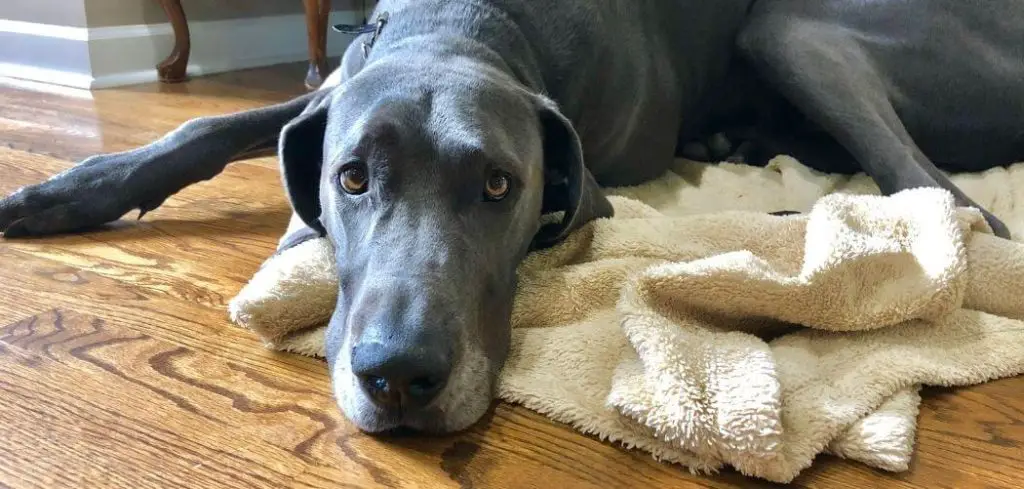When your dog has loose stool after surgery, it can be stressful and concerning for any pet owner. Surgery already puts your dog’s body under strain, and seeing digestive issues afterward can make you worry that something is wrong.
Loose stool after surgery is not uncommon and can happen for several reasons.
We outline the common reasons a dog may develop loose stool after surgery, what you can do at home, and when to seek veterinary help.
Table of Contents
Dog Loose Stool After Surgery — Why It Happens
A dog may develop loose stool after surgery due to the stress of anesthesia, changes in diet, pain medications, and antibiotics which can all disrupt the digestive system. Some dogs experience diarrhea due to the stress of hospitalization, while others react to new foods offered during recovery. In some cases, complications such as infection or inflammation may also play a role.

Dog Loose Stool After Surgery: Common Causes
Stress and Anxiety
The hospital environment, separation from you, and the physical stress of surgery can trigger digestive upset in dogs. Stress can increase gut motility, leading to loose or watery stool.
You may also notice restlessness, panting, or clinginess at home as part of your dog’s recovery.
Stress-related diarrhea usually improves as your dog feels more secure and returns to their normal environment.
Read more: Dog Loose Stool With Blood (What it means and when to worry)
Medications
Pain relievers, antibiotics, and anti-inflammatory drugs are common after surgery. These medications can irritate the stomach or disrupt the balance of healthy gut bacteria.
Loose stool caused by medication may appear soon after you begin giving the prescribed drugs. While mild diarrhea may resolve, severe or persistent diarrhea could indicate your dog is not tolerating the medication well.
Dietary Changes
After surgery, many vets recommend a bland or prescription diet. Sudden changes from your dog’s usual food to a recovery formula can upset their stomach.
Loose stool from diet changes is often temporary, but if your dog refuses the new food or symptoms persist, you may need to adjust their meals under veterinary guidance.
Anesthesia Effects
Anesthesia can temporarily slow or disrupt digestive function. This may lead to changes in stool consistency in the first few days following surgery.
In most cases, your dog’s digestion stabilizes as the body clears the anesthetic drugs. However, prolonged diarrhea after anesthesia should still be monitored.
Infection or Inflammation
While mild diarrhea can be a normal recovery symptom, infection is a more serious concern. If bacteria enter the surgical site or your dog develops intestinal inflammation, stool may contain mucus or even blood.
You may also notice fever, lethargy, or loss of appetite alongside the loose stool. These are red flags that require immediate veterinary attention.
Sensitivity to Post-Surgery Care
Sometimes, the way your dog reacts to recovery care at home—such as new treats, supplements, or restricted exercise—can affect their digestion. A sudden decrease in activity can slow the gut, while new products or flavorings may upset the stomach.
If you’ve added anything new to your dog’s routine after surgery, this may be contributing to the loose stool.
What to Do
If your dog develops loose stool after surgery, first stay calm. For many dogs, mild diarrhea resolves on its own within a couple of days.
Offer small, frequent meals of a bland diet such as boiled chicken and rice, unless your vet has prescribed a specific recovery diet. Ensure your dog always has access to fresh water to prevent dehydration.
Give prescribed medications exactly as directed. Do not stop antibiotics or pain relievers without consulting your veterinarian, even if you suspect they are causing diarrhea.
Keep your dog’s environment calm and comfortable. Reducing stress and allowing your dog plenty of rest can help the digestive system recover more quickly.
If symptoms are mild, monitoring at home while providing supportive care is often enough. But if loose stool continues or worsens, professional advice is essential.
When to Call or Visit Your Vet
Loose stool after surgery is not always an emergency, but certain signs should prompt immediate veterinary care.
If your dog’s diarrhea is accompanied by vomiting, lethargy, fever, or refusal to eat or drink, call your vet right away. These may be signs of infection, dehydration, or a complication related to the surgery.
Presence of blood in the stool or black, tarry diarrhea is also concerning and should be treated as urgent. Blood may indicate internal bleeding, severe infection, or other serious conditions.
If the loose stool lasts more than 48 hours or worsens instead of improving, seek veterinary guidance. Recovery should generally show steady progress, not decline.
Finally, if your dog is a puppy, senior, or has a pre-existing health condition, do not wait—these dogs are more vulnerable to dehydration and complications.
Read more: Dog Loose Stool With Mucus (Here’s what could be going on)
Key Takeaway
Loose stool after surgery can happen for a variety of reasons, from stress and diet changes to medication effects.
While mild diarrhea may improve with supportive care at home, it is important to monitor your dog closely for red flags such as blood, persistent vomiting, or lethargy.
When in doubt, call your veterinarian. Prompt advice and treatment will ensure your dog’s recovery stays on track and that small issues do not turn into serious complications.
